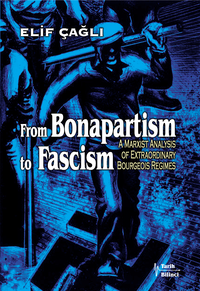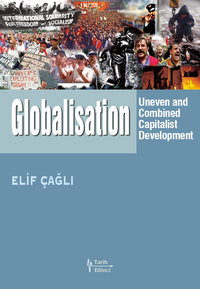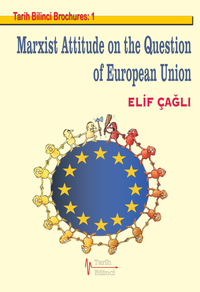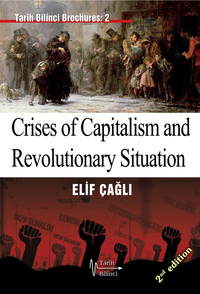Because of capital’s need for overcoming national barriers in the imperialist epoch, monopolist competition has an international dimension. Major capitalist states compete with each other to establish their domination over sales markets, raw material markets and capital investment areas. Even if this competition is possible to carry on in a relatively peaceful manner in periods of boom, it becomes impossible in periods of big and deep crises. In such periods, struggle among imperialist states for hegemony over spheres of influence may turn into open wars for division. Imperialist wars are nothing more than continuation by military means of the policy of rivalry among imperialists. Therefore, it is false to immerse oneself in the forms of this competition among capitalist groups which may be peaceful one day and the opposite on the other, rather than trying to analyse the content of it.
Even if imperialist states and different capital groups are in intricate relations internationally, it is a unity in rivalry. Thus, in some periods when the rivalry becomes heated, a tendency towards arming and wars emerges in the imperialist countries. If important changes occur in existing economic balance of power and the hegemony crisis deepens, imperialist powers may have to carry on their world policy through arms in order to settle their accounts.
The capitalists divide the world, not out of any particular malice, but because the degree of concentration which has been reached forces them to adopt this method in order to obtain profits. And they divide it "in proportion to capital", "in proportion to strength", because there cannot be any other method of division under commodity production and capitalism.[1]
While laying bare the tendencies characterizing the imperialist epoch, Lenin was insistently struggling against the claims that capitalism would gradually arrive at a “peaceful” operation. For instance, acting in an attempt to be a mentor for imperialists, Kautsky (ancestor of the present day renegades) says, “The urge of capital to expand ... can be best promoted, not by the violent methods of imperialism, but by peaceful democracy”.[2] Nevertheless, imperialist wars, militarism, violent methods accompanying the re-division of the world, all these are indispensable parts of the imperialist epoch. For that reason, those like Kautsky who consider imperialism as one of the policies –only a policy of oppression and violence- of finance capital and not an inherent necessity, must be politically condemned.
Kautsky concluded that a “peaceful capitalism was possible” due to the trend of increasing international mingling among finance capital cliques. He arrived at this conclusion from his “ultra-imperialism” analysis which suggested that monopolist associations would create a single world trust preventing competition and crises. But Lenin tried to expose that competition and crises are re-created at higher levels through formation of capitalist monopolist associations. It was a dangerous dream in bare conflict with the realities to think that imperialism would be a “peaceful” epoch of expansion. Lenin defined imperialism not as a form of “policy”, but as just the modern capitalism itself. He underlined that oppression and violence were inseparable parts of imperialist capitalism.
On the other hand Kautsky regarded imperialism as the tendency of industrialized countries to annex ever wider agricultural areas. However, imperialism did not consist only of this even if imperialist wars led to land annexations in backward countries. Right at this point Lenin drew attention to a very important fact. He reminded that in a conjuncture when competition among imperialist countries becomes harsh and grows into an imperialist war, these countries would also attack industrialized capitalist countries with an eye to weakening the rivals and establishing their own hegemony. Germany’s attack to Belgium for braking England’s domination was an example for that. By that way, Belgium did not become a colony of Germany, but the arena of imperialist war was widened. In order to protect its nation state, Belgium bourgeoisie determined its side with respect to the concrete conditions between imperialist sides.
As proved by various regional wars reflecting the fight for hegemony among imperialist powers, a “peaceful capitalism” is still a dangerous dream today. This “dream” is a sophistry asserted by “modern” renegades in the example of Kautsky for undermining the revolutionary struggle of the working class. The US case –as the hegemonic power that marked the imperialist epoch -is a clear example of aggressive expansionism of finance capital. Years under hegemony of US imperialism very clearly reveal the ways of maintaining this hegemony and making various independent states accept it. Imperialism means oppression on various nations, interfering with their internal affairs, political intrigues, political gangsterism, and, most importantly, imperialist wars. And imperialism has proved that it can well maintain its damned job without colonizing other countries. If profitable, it is obvious that imperialist countries instigate national distinctions, create new national questions by pitching nations against one another. Besides, in regional wars provoked by imperialist powers, territories of the countries on the target can be occupied and therefore national question may also gain and regain importance. But when all these examples carefully examined, different from the colonialist era the result is not creation of new colonies, but establishment of new bourgeois governments or new nation states adhering to the dominating imperialist state.
[1] Lenin, “Imperialism”, p.253
[2] Cited in Lenin, ibid, p.289
link: Elif Çağlı, Inseparable part of imperialist epoch: Wars for hegemony, August 2002, https://enternasyonalizm.org/node/592






